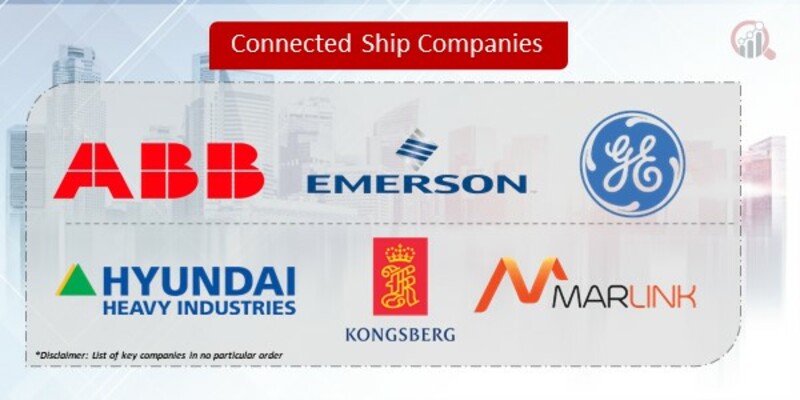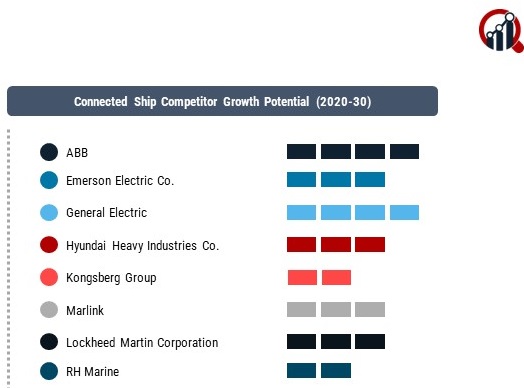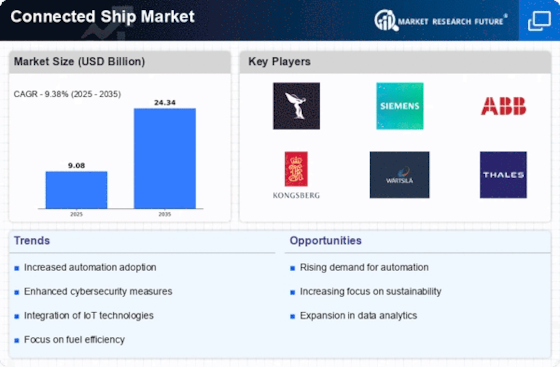Top Industry Leaders in the Connected Ship Market
 Key Players
Key Players
ABB (Switzerland)
Emerson Electric Co. (US)
General Electric (US)
Hyundai Heavy Industries Co.
Ltd (South Korea)
Kongsberg Group (Norway)
Marlink (France)
Lockheed Martin Corporation (US)
RH Marine (Netherlands)
Rockwell Automation Inc. (US)
Schneider Electric (France)
Siemens AG (Germany)
Viasat Inc. (US)
Wärtsilä (Finland)
Intelsat (Luxembourg)
Inmarsat Plc (UK)
Strategies Adopted
Current investment trends in the Connected Ship industry underscore a focus on research and development, network infrastructure, and cybersecurity measures. Key players are directing investments towards developing next-generation satellite communication systems, IoT sensors, and edge computing platforms for connected ship applications. Investments in data analytics tools, machine learning algorithms, and predictive maintenance solutions are prevalent, reflecting the industry's shift towards data-driven decision-making and condition-based maintenance strategies. Additionally, strategic investments in network resilience, redundancy, and backup solutions aim to ensure reliable connectivity and data transmission for connected ship operations.
The overall competitive scenario in the Connected Ship market is characterized by established connectivity providers, technology integrators, and maritime service providers, each navigating the industry with distinct strategies. Market share analysis considers factors such as connectivity performance, data analytics capabilities, cybersecurity measures, and customer satisfaction. The industry's responsiveness to technological advancements, regulatory requirements, and customer feedback further shapes competitiveness. As the maritime industry embraces digitalization and connectivity, companies in this sector are focused on delivering innovative, reliable, and secure connected ship solutions that enhance operational efficiency, safety, and sustainability for shipowners, operators, and crew members.
Emerging Companies
As maritime stakeholders increasingly recognize the benefits of connected ship solutions, new and emerging companies are entering the market, contributing to innovation and product development. Start-ups and specialized firms such as Marlink, KVH Industries, Inc., and Speedcast International Limited are gaining recognition by providing novel connectivity solutions and digital platforms tailored to specific maritime applications, such as fleet management, voyage optimization, and crew welfare. These companies leverage expertise in satellite communication, IoT sensors, and cloud computing to deliver seamless connectivity and data-driven insights for shipowners and operators. The industry is witnessing a trend towards the development of open architecture systems, standardized protocols, and interoperable platforms, enabling greater flexibility and scalability in connected ship solutions.
Industry news within the Connected Ship market reflects ongoing trends, regulatory changes, and technological advancements driving the sector forward. News related to successful connected ship deployments, industry collaborations for maritime digitalization projects, and advancements in satellite communication technology showcase efforts to improve vessel connectivity and operational efficiency. Moreover, developments in cybersecurity solutions, data analytics algorithms, and regulatory compliance standards are frequently covered in industry news, highlighting the importance of cybersecurity and data privacy in connected ship operations. Additionally, news related to industry partnerships, mergers, and acquisitions underscore the dynamic nature of the connected ship market and the strategic initiatives undertaken by companies to strengthen their market position.
Recent News
Kongsberg Maritime (Norway):
Focus on Integrated Ship Control Systems: Kongsberg's K-Chief system integrates automation, navigation, and communication technologies, offering centralized control and data visualization for connected ships.
Partnership with Ocean Infinity: Kongsberg collaborates with Ocean Infinity on autonomous survey vehicles equipped with advanced sensors and connectivity solutions.
ABB Marine & Ports (Switzerland):
Emphasis on Smart Grid and Energy Management: ABB's ABB Ability Marine portfolio provides solutions for optimizing onboard power generation and distribution, contributing to fuel efficiency and emissions reduction.
Focus on Port Automation and Connectivity: ABB develops technology for automated container terminals and connected port ecosystems, streamlining logistics and data exchange.
Wartsila Corporation (Finland):
Focus on Remote Monitoring and Predictive Maintenance: Wartsila's Condition Based Maintenance system collects real-time data from onboard sensors, enabling remote monitoring and predictive maintenance to prevent downtime and optimize operations.
Emphasis on Hybrid and Alternative Power Systems: Wartsila develops hybrid and fuel-cell solutions for ships, reducing reliance on fossil fuels and minimizing environmental impact.
Rolls-Royce Power Systems (UK):
Focus on Autonomous and Remotely Operated Ships: Rolls-Royce pioneers the development of autonomous and remotely operated ships, particularly for offshore applications and harsh environments.
Emphasis on Intelligent Ship Propulsion Systems: Rolls-Royce develops intelligent engine and propeller systems that adapt to operational conditions, optimizing fuel efficiency and performance.
Navis (USA):
Focus on Cloud-Based Ship Management and Logistics Platforms: Navis offers cloud-based platforms for managing vessel schedules, cargo data, and port operations, providing real-time visibility and streamlining communication across the supply chain.
Emphasis on Collaboration and Data Sharing: Navis promotes collaboration and data sharing between stakeholders in the maritime industry through its connected ship platform.
Emerging Trends in Connected Ship Companies:
Increased adoption of artificial intelligence and machine learning for data analysis and decision support.
Focus on cybersecurity and data privacy in connected ship technology.
Expansion of shore-based support systems and remote operation of vessels.
Development of standardized data formats and communication protocols for interoperability.
Emphasis on integration with broader logistics and supply chain ecosystems.










